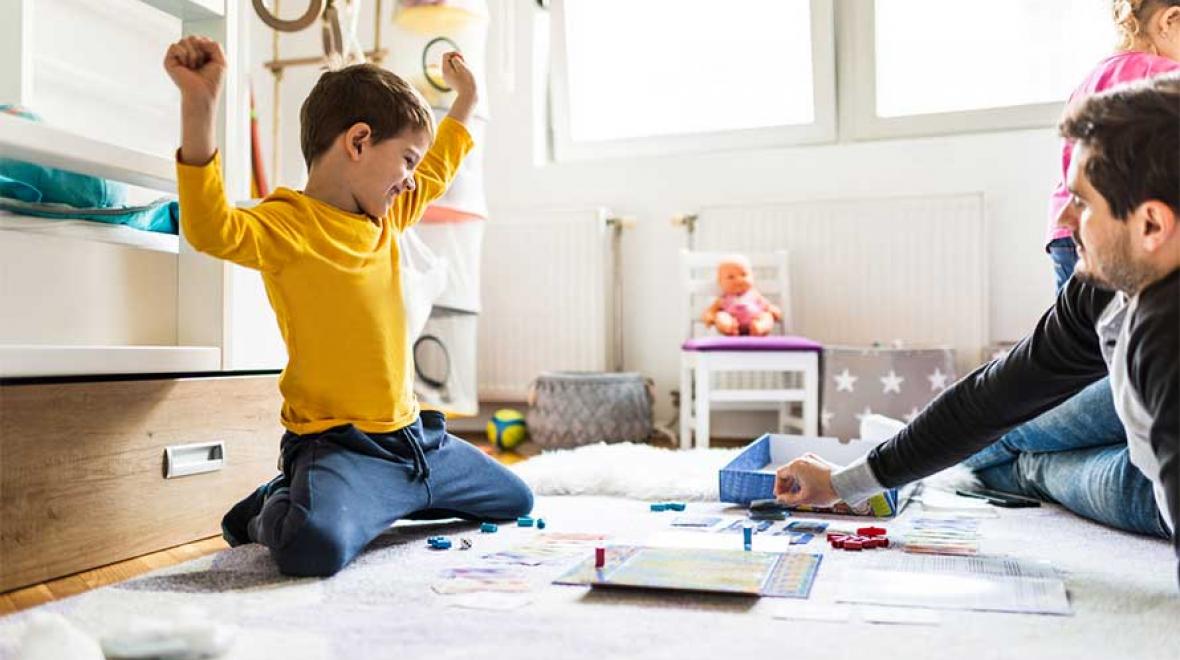
This fall, our kids are living in a whole new world of virtual learning. With so much potentially boring screen time, many parents are looking for ways to supplement their child's education in more fun, less stressful ways.
How can parents work with kids to learn new skills even when class is dismissed? Enter a popular trend that's gaining steam among virtual learning families: gameschooling. Whether you use it as your primary method of teaching your children or simply to supplement their virtual education, gameschooling will almost certainly be a great option for your family.
What is gameschooling?
So what is gameschooling? Just like it sounds, gameschooling is teaching through playing games. Whether it's manufactured board games you buy or a game you create in your own home, it’s all about games, games, games — click the links for some of my kindergartener’s favorites.
Why should you consider gameschooling? Kids can only sit through lectures, educational videos and workbooks for so long before getting antsy and losing focus. But games? Kids can play games for hours.
How can my child learn just by playing games?
Even the most basic games (think Candy Land) teach young kids skills such as taking turns and displaying good sportsmanship. With a bit of research you can take your kids’ game playing to a whole new level, finding games that teach specific subjects and upping the ante into games that require true strategy and critical thinking based on ability level. Because games are inherently fun, children are much more likely to stay engaged and focused.
What about the three R’s?
The amount of structure you want to include in your child’s education is up to you. While some gameschooling families use games only to supplement instruction in areas where their kids are struggling, some homeschool families choose to make gameschooling their entire curriculum.
Either way, when kids enjoy learning, they are much more likely to remember what they learn and be able to apply that knowledge to their daily lives. Think of it like this: You may play a game like Zingo that teaches your child phonics and spelling. You could then encourage your child to write a letter to a pen pal, thereby utilizing what they have learned in a practical way that still doesn’t feel like “work.”
What if my children are at different ability levels?
Having kids at different levels of development and ability doesn’t mean that they can’t play games together. In fact, playing games encourages teamwork and mentorship. Many games, such as Forbidden Island, have a cooperative option, meaning your kids can work together to beat the game, as opposed to competing against one another.
This is a great way for older or more advanced children to learn patience. The act of teaching younger siblings a new skill or idea also reinforces knowledge that the older siblings already have. In addition, many simple games can be altered to teach specific subjects to older children, while still being simple enough for younger ones to manage. This version of Guess Who is an example.
What other benefits does gameschooling offer my family?
Playing games creates opportunities for quality family time and encourages social interaction during a time when so much in our lives revolves around screens. Playing games can also reduce the stress caused by teaching, especially for a parent who never anticipated having to be so involved in their child’s day-to-day education. Gameschooling gives caregivers the freedom to select and curate games specific to their child’s interests, helping to facilitate a positive learning environment.
What if I can’t afford to buy a bunch of games?
If buying new games isn’t in the cards, many communities provide online resources devoted to sharing and trading games with other gameschooling families. If a group doesn’t already exist in your community, consider starting one with other like-minded parents in your friend group. Secondhand stores often have board games for sale at reasonable prices, and some libraries have games available to either play on-site or check out.
How do I get started?
Interested families can check out websites such as My Little Poppies and The Gameschool Academy, which are dedicated to gameschooling. These sites are filled with advice about what games are suitable for specific subjects, age groups and ability levels. In addition, parents can find Facebook groups that are focused on educating parents about the many options available within the realm of gameschooling. If you’re not sure how your family will take to this learning strategy, consider investing in just a few games at first, and seeing how it goes.











